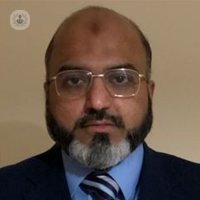Considering every aspect of anterior cruciate ligament (ACL) reconstruction
Written in association with:Reconstructing the anterior cruciate ligament (ACL) can be a beneficial procedure for people who want a stable knee and an active lifestyle without more pain, injury or loss of strength and movement. However, there are various elements to consider before going ahead with this operation.
Leading orthopaedic surgeon Mr Ayaz Lakdawala, who has years of experience in diagnosis and management of orthopaedic knee conditions and sports injuries, considers different treatment options, risks and benefits and the surgical – and non-surgical - process involved in ACL. In part two, he looks at what should be considered before undergoing the procedure.
Anterior cruciate ligament reconstruction is an operation to remodel the torn anterior cruciate ligament (ACL) and restore stability to the knee joint. The ACL is one of the main stabilising ligaments of the knee and also provides significant feedback information (proprioception) to the muscles surrounding the knee, allowing for coordinated activities.
It is very common for injuries to occur while doing sporting activities, particularly football, rugby, netball and skiing. ACL cannot repair itself, so when it has been torn it often leads to instability in the knee, which patients report as ‘the knee giving way’. Sometimes patients may experience pain or an ongoing lack of confidence in their knee preventing them from returning to sporting activities. Patients with this injury need thorough clinical assessment by a knee specialist.

Why would I need an ACL reconstruction?
Not everyone with ACL rupture will require surgery. I will assess your knee and will go through your treatment options and explain what would work best for you.
Surgery is more likely to be recommended in certain situations. For example, if you:
- Play sports to a high level; such as ones that include a lot of twisting and turning like football, rugby or basketball, and you want to get back into it
- Have a very physical or manual job, for example you’re a firefighter, police officer or work in construction
- Have damage to other parts of your knee, which could also be repaired with surgery
How do I make a decision about having operation to reconstruct ACL?
I will talk you through the risks and benefits of surgery and explain alternatives to having an operation. Having ACL reconstruction could help to stabilise your knee and relieve pain. It might mean you’re able to return to your usual level of activity or sports. There is increasing evidence, particularly in children and teenagers but less certain in later adulthood, that stabilising the knee can protect it from further impairment such as cartilage damage and early-onset knee degeneration.
However, you need to prepare yourself for the fact that it can take six months to fully recover from ACL reconstruction and often nine months to return to full sports. There is a structured physiotherapy after the operation to ensure a successful outcome. You’ll also need to stick to the exercise regime given to you to help you get back to the level of sporting activity you want. As with all surgical procedures, there is also a low risk of complications, and there is a small possibility that the procedure may not work.
I will explain exactly what will happen during the procedure, what to expect afterwards and the risk of potential complications. You will be given time to make sure you understand everything and have an opportunity to ask any questions. If you’re happy to go ahead with the procedure, I will make arrangements for your surgery to take place and you will need to sign a consent form. You will have ample opportunity to discuss any of your concerns and ask questions about your operation and after care. I will discuss with you the choice of grafts used for reconstruction but hamstring grafts are commonly used.
Timing of surgery
Surgery isn’t usually done straightaway after the injury, to allow some time for any swelling to go down. Initially, you’ll usually have physiotherapy. The ideal time for surgery is when the swelling has gone down and you have regained full or near normal range of knee movements.
Are you considering ACL surgery? Visit Mr Ayaz Lakdawala's Top Doctor's profile here for his expert advice.


